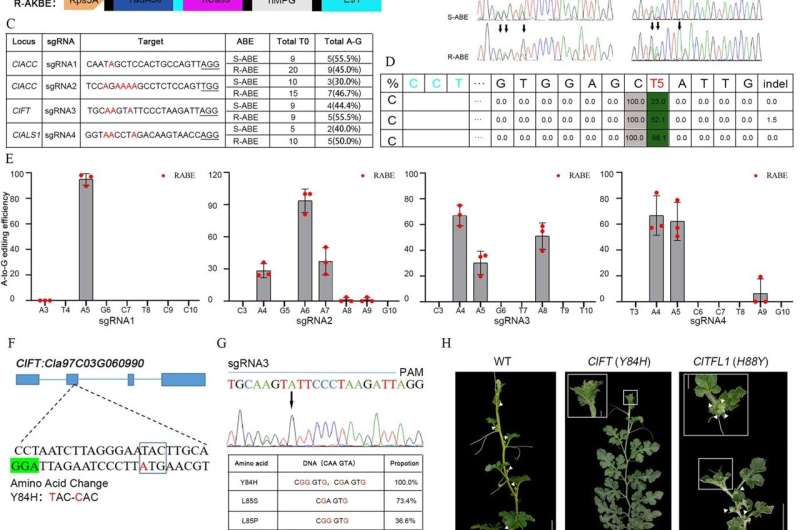This article has been reviewed according to Science X's editorial process and policies. Editors have highlighted the following attributes while ensuring the content's credibility:
fact-checked
peer-reviewed publication
proofread
Fruitful innovation: Transforming watermelon genetics with advanced base editors

The development of new adenine base editors (ABE) and adenine-to-thymine/guanine base editors (AKBE) is transforming watermelon genetic engineering. These innovative tools enable precise A:T-to-G and A:T-to-T base substitutions, allowing for targeted genetic modifications.
The research highlights the efficiency of these editors in generating specific mutations, such as a flowerless phenotype in ClFT (Y84H) mutant plants. This advancement not only enhances the understanding of gene function but also significantly improves molecular breeding, paving the way for more efficient watermelon crop improvement.
Traditional breeding methods for watermelon often face challenges in achieving desired genetic traits efficiently and accurately. While CRISPR/Cas9 has provided a powerful tool for genome editing, its precision and scope are sometimes limited. These limitations highlight the need for more advanced gene-editing technologies.
The development of new base editors, which can introduce specific base changes, represents a significant step forward. Due to these challenges, there is a growing necessity to develop precise and efficient gene-editing techniques to enhance watermelon breeding and achieve more reliable crop improvements.
Researchers from Northwest A&F University and Northeast Agricultural University have published a study in Horticulture Research, on April 23, 2024, detailing the development of adenine base editors (ABE) and adenine-to-thymine/guanine base editors (AKBE) base editors for watermelon. These editors allow precise genetic modifications, potentially improving crop traits and breeding efficiency.
The study introduces three types of adenine base editors (U-ABE, S-ABE, and R-ABE) and evaluates their efficiency in inducing A:T-to-G substitutions in watermelon genes. Among them, R-ABE demonstrated the highest efficiency, particularly at the A5 position of the target gene.
Additionally, the researchers developed S-AKBE and R-AKBE to achieve A:T-to-T mutations, with S-AKBE showing greater efficiency. The successful editing of the ClFT gene to produce the Y84H mutation resulted in a flowerless phenotype, underscoring the potential of these tools in manipulating flowering time and other traits in watermelon.
The findings reveal that the Rps5A promoter used in R-ABE and R-AKBE significantly enhances editing efficiency. Overall, this study highlights the effectiveness of these base editors in achieving precise genetic modifications, paving the way for improved breeding strategies and trait enhancements in watermelon.
Dr. Xian Zhang from Northwest A&F University commented, "The development of these base editors represents a significant breakthrough in plant genetic engineering. These tools not only enhance our ability to study gene function but also pave the way for more precise and efficient crop improvement strategies."
The implementation of ABE and AKBE base editors opens new avenues for watermelon breeding, allowing for the precise introduction of beneficial traits. Future research will focus on optimizing these tools and exploring additional target genes to further enhance the genetic improvement of watermelon and potentially other crops.
More information: Dong Wang et al, Development of ABE and AKBE base editors in watermelon, Horticulture Research (2024). DOI: 10.1093/hr/uhae123
Journal information: Horticulture Research
Provided by Northeast Agricultural University





















